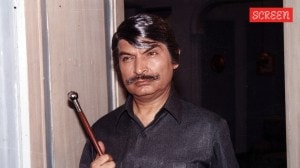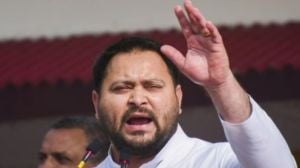‘I am a loyal party activist… Vichar must be debated, not vyakti’
• Your paper at the Thinkers’ Meet has led to a storm in the BJP, soon after the Advani-Jinnah row. The BJP seems to be a party of...

• Your paper at the Thinkers’ Meet has led to a storm in the BJP, soon after the Advani-Jinnah row. The BJP seems to be a party of hardliners with no place for moderates like you.
Radha Prasad
I don’t agree the BJP is a party of hardliners. Its ideology is a testimony to the power of rational ideas and rousing idealism. Its two top leaders, Atal Behari Vajpayee and L K Advani, embody the virtues of moderation and balance. I urge you to read ‘‘Integral Humanism’’, the BJP’s basic ideological treatise written by Pandit Deendayal Upadhyaya. In the post-Independence evolution of political philosophy, it has few parallels in terms of its affirmation of universal humanistic values rooted in Indian intellectual ethos, its non-sectarian and inclusive understanding of Indian nationalism, and its mind-expanding views on the holistic development of the individual and the nation. There can be no place whatsoever for a ‘‘hard line’’ in a party that accepts ‘‘Integral Humanism’’ as its guiding philosophy.
• Why does BJP tend to be apologetic about the evolution of its ideology? Advani’s speeches in Pakistan and your document at the Thinkers’ Meet symbolise a positive evolution. Yet, senior party leaders slam such moves instead of welcoming them.
Gaurav Dua
What you consider to be the ‘‘evolution’’ of the BJP’s ideology is actually its foundational principle. Not many people know that it was Deendayal Upadhyaya who, in his presidential address at the Calicut session of the Bharatiya Jan Sangh in December 1967, had said, ‘‘We are pledged to the service not of any particular community or section, but of the entire nation. Every countryman is blood of our blood and flesh of our flesh.’’ I recall here what Atalji had told a group of Muslims who had come to pledge their support to him in the run-up to the LS elections: ‘‘I have been trying since many years to see that Hindus and Muslims in India walk hand-in-hand, live in brotherhood, help one another, provide each other security and strive together to take the country forward.’’
The BJP’s own ‘‘Vision Document’’, released before the elections, had said, ‘‘The BJP gives a three-point assurance to minorities: education, economic upliftment, and empowerment. At the same time, we appeal to them to change their old mindset vis-a-vis the BJP.’’ Our loss in the elections does not in the least diminish the continuing relevance of these words — both for my party and for our country. But this is also a time for honest introspection among Muslim leaders and intellectuals. Isn’t it a fact that the Congress and the likes of Laloo Yadav have cynically exploited Muslim support in the name of ‘‘defence of secularism’’ for perpetuating their own corrupt rule? Have they cared to improve the lives of common Muslims? My heart bleeds when I see my Muslim friends living in ghetto-like conditions in Mumbai and Delhi. How can the Congress shirk its responsibility for this? If the BJP and Indian Muslims change their attitude towards each other, it would strengthen nationalism, make our democracy healthier by freeing it from the pernicious effect of every kind of vote-bank politics, and give a big boost to India’s egalitarian development.
• As L K Advani’s speech-writer, did you foresee the uproar his comments on Jinnah would create? Was the aim of that speech indeed a makeover for Advani?
M L Garg
Those who think that Advaniji’s visit to Pakistan was an exercise in ‘‘image makeover’’ know neither his true personality nor the lofty vision guiding the Indo-Pak peace process. He went to Pakistan to promote mutual trust, goodwill and understanding, which are prerequisites for achieving permanent peace and normalisation of relations between our two countries. He forcefully called for an end to cross-border terrorism. At the same time, he repeatedly affirmed that the long period of tension, hostility and animosity between India and Pakistan must be replaced by a new era of peace, friendship and all-round cooperation. He persuasively argued that resolution of all contentious issues through patient and sustained dialogue was the only way to achieve this transformation. All this was contrary to the image of a ‘‘hawk’’ that had been unfairly created. If that image crumbled, it is because it had to. As for Advaniji’s comments on Jinnah, there is no scope for criticism if its content and context are properly understood. Nobody can deny that Jinnah’s speech at Pakistan’s Constituent Assembly was a welcome affirmation of the principle of a secular, non-theocratic state. That Pakistan has failed to live up to this principle is equally undeniable. By approvingly referring to this speech, and by asserting that secularism, pluralism, tolerance and peaceful coexistence are the ideals worthy of being followed equally in India, Pakistan and Bangladesh, Advaniji has endeared himself to all the right-thinking people of South Asia.
• Do you feel you have been made the fall guy for the Advani controversy? What are your views on the whole Advani-Jinnah issue? What future do you foresee for yourself in the BJP in view of the criticism by some of its senior members?
V P Damodar
I am only an ordinary, but loyal, activist of my party. The traditions of my party have taught me that vichar (ideas) should be debated, and not vyakti (individuals). As far as the ‘‘Advani-Jinnah issue’’ is concerned, it has already produced a highly educative debate. There is a saying in Sanskrit: ‘‘Vaade vaade jaayate tatvabodhah.’’ (A society is educated through debate and discussion.) Thanks to the commendable work by the media, millions of people are now more aware than before about the tragic saga of the Partition. This mass awareness is immensely useful for ‘‘undoing the follies of the Partition’’.
• Do you consider Jinnah to have been secular? How then do you explain his two-nation theory?
Ram Agarwal
As attested by Gopal Krishna Gokhale, Sarojini Naidu and many others, Jinnah was undoubtedly secular in his early years. But after 1934, he adopted separatist politics using the totally flawed ‘‘two-nation’’ theory. His cynical advocacy that ‘‘Hindus and Muslims are two separate nations, with little in common in terms of culture, religion, customs and outlook to life’’ was an affront to historical truth. By this warped logic, it follows that the Muslims who stayed behind in truncated India after 1947 also constitute a separate nation within the Indian nation. Who can accept this? Nevertheless, we must bear in mind that Jinnah was not solely responsible for the Partition. The Congress leadership of the time was also partly responsible.
This whole debate has highlighted two lessons. First, history cannot be correctly comprehended by demonising certain personalities. Second, nothing worthwhile can be gained by keeping the debate past-focused; it must be future-focused. Both India and Pakistan have inherited from the 20th century certain Partition-related problems. Let us together think of how to put them behind us quickly and seize the bright new opportunities that the 21st century offers.
• The RSS and VHP are just excess baggage and the sooner the BJP gets rid of them the better. The BJP can then emerge as a strong Opposition party, backed by a vast, secular, middle-class, progressive population, which considers religion a private matter and Ram Janmabhoomi irrelevant. Please comment.
C S Pathak
I beg to differ on your remarks about the RSS. I regard the RSS as a nationalist organisation. However, it suffers from an image problem, about which the RSS too must seriously introspect. How can anyone disregard the fact that its functionaries live very simple and selfless lives and have dedicated themselves for the cause of the nation? Doesn’t this idealism deserve to be appreciated? What is it, if not a deep love for the motherland, that inspires thousands of swayamsevaks to leave their homes and work in tribal areas, in the North-East, and in other places without expecting anything for themselves? There is a need for a healthy debate about the RSS, rather than the kind of demonisation that we often see in the media.



- 01
- 02
- 03
- 04
- 05



























